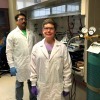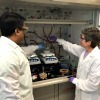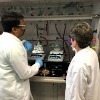
The success of our youth and their ability to become global leaders who are equipped to solve the most pressing challenges of our nation and our world will depend on the skills they learn by studying science, technology, engineering, and math – collectively known as STEM education.
Promoting STEM education and careers in engineering is a central component of ND Energy. Over the past five years, area high school teachers have participated in the Research Experiences for Teachers (RET): Engineering a More Sustainable Energy Future program, focused on developing new curriculum to support STEM education.
Administered by ND Energy, the RET summer program began in 2012 with funding by the National Science Foundation (NSF). Led by principal investigator, Joan F. Brennecke, Keating-Crawford Professor of Chemical and Biomolecular Engineering, about 15 high school teachers participated each year during the four-year period the program was funded by the NSF. When funding ended, ND Energy continued the program under the leadership of Managing Director, Ginger Sigmon, and accepted another seven teachers in 2016. By maintaining the program, ND Energy has kept the momentum going with participating school corporations and has laid the groundwork to submit a new proposal to NSF that will build upon previous successes and the contributions made by participating educators to the development of STEM education.
During each year of the RET, teachers were tasked with developing new or enhanced curriculum for their classrooms based on their experiences and the new skills and knowledge they obtained during their participation in various projects within Notre Dame’s research laboratories. This year, teachers also attended five sessions on curriculum development provided by Notre Dame’s Center for STEM Education and heard from representatives of local businesses and Notre Dame’s first year engineering program about preparing students for STEM careers and college-level courses. Teachers also participated in open discussions about STEM education and other related topics while sharing their own personal experiences with fellow educators. At the conclusion of the program, teachers earned non-degree graduate credits and broadened their professional networks with researchers from Notre Dame and other STEM educators. One participant described her experience by stating, “RET has been the most valuable training I have received since I graduated for improving my science knowledge.” This statement alone upholds one of the most critical elements of the RET program, which is providing teachers the opportunity to work alongside ND researchers to gain new skills and knowledge that will influence their curriculum development and help to renew their enthusiasm for science.
ND Energy is encouraged by this year’s program and the ability to provide the means for advancing STEM education and careers in engineering through shared knowledge and skills and experiences between teachers and researchers. Together with researchers and teachers, ND Energy remains focused on creating new or enhanced education programs that will allow students to become successful in science, technology, engineering, and math.
The new proposal to NSF will encompass best practices and lessons learned from previous program years and will focus on developing long-term collaborative partnerships between STEM teachers, ND researchers, local community colleges, and industry representatives. The proposal will also emphasize developing partnerships with schools serving underrepresented minorities, women, and persons with disabilities. Dr. Amy Hixon, Assistant Professor in the Department of Civil & Environmental Engineering & Earth Sciences, will be the principal investigator. According to Hixon, “This is the right time for ND Energy and Notre Dame to join the national pursuit to advance STEM education across the country and throughout our individual communities. As participants in higher education, we acknowledge the need for students to be successful in science, technology, engineering, and math and are committed to helping our communities broaden their educational opportunities and career choices for the future of our youth.”


Ann Rutherford, 2016 RET teacher, is shown here with Dr. Sunil Upadhyay, Postdoctoral Researcher in Dr. Jennifer Schaefer’s laboratory. Ann’s summer research project was to synthesize and characterize electrolytes for rechargeable lithium and/or magnesium batteries. As a result of the separation techniques she learned through her research, Ann developed new lessons and activities focused on classifying matter and separating mixtures. The new activities will give the students more in-depth experience with these important concepts. Ann is a teacher at Marian High School in Mishawaka, Indiana.
ND Energy is a University Research Center whose mission is to build a better world by creating new energy technologies and systems and educating individuals to help solve the most critical energy challenges facing our world today. For more information, visit the ND Energy website at energy.nd.edu or contact Barbara Villarosa, Business and Communications Program Director, at bvillaro@nd.edu or 574-631-4776.
Originally published by Barbara Villarosa at energy.nd.edu on September 06, 2016.